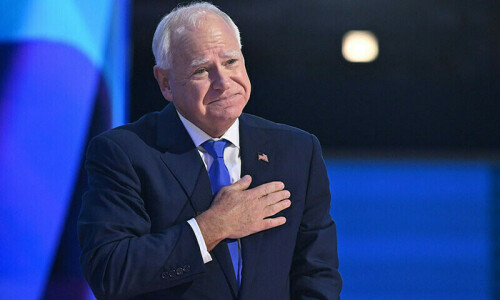
WASHINGTON: At the 2024 Democratic National Convention (DNC), Pakistani Americans made a notable debut by hosting a special luncheon for party delegates, marking their first significant attempt to assert their presence at a major party convention.
Congressman Tom Suozzi, chair of the Pakistani Congressional Caucus, addressed the attendees, advocating for the luncheon to become an annual tradition with a broader scope. Despite its modest scale, the event was viewed by organiser Rao Kamran Ali as “the first step toward encouraging the community to engage more in American politics, rather than solely focusing on Pakistani issues”.
Tahir Javed, a Texas Democrat and another organiser, highlighted the importance of engaging with American political parties. “While staying connected with Pakistani political parties reflects our nostalgia, it is the Democrats and Republicans in the US who can address our issues, not any Pakistani party.”
Many in political milieu believe diaspora’s conservatism will cause them to gravitate towards Trump
This sentiment is shared across the political spectrum.
Sajid Tarar, founder of the American Muslims for Trump group, observed, “Pakistani Americans can play an effective role in American politics too, but only if they move beyond their PTI-PPP mindset.”
Fayyazul Hassan, a Texan Democrat and veteran party delegate, agreed. “We need to accept the reality that there’s no going back. Even if we did, our kids won’t,” he said. “We must participate in American politics if we want to have a say.”
The role of delegates is crucial, as they elect the president, even if their choice diverges from the popular vote, as seen in 2016 when Hillary Clinton received more votes than Donald Trump but lost the election.
Despite increasing involvement, many Pakistani Americans remain undecided about their choices for the November 2024 elections. Both Democrats and Republicans lament the community’s detachment from US politics.
“Most of them don’t even register to vote,” Tarar noted. “And only a few engage in meaningful political discussions.”
Fayyaz shares these concerns but he’s hopeful that attitudes will shift by November. “There’s so much at stake in this election,” he said. “The outcome will affect everyone, and Pakistani Americans are aware of that too.”
Ayesha Khan, who ran for Congress from Maryland in the 2024 Democratic primary and finished fourth out of 22 candidates, is optimistic about the younger generation driving change. “This generation celebrates August 14th with their parents but is more focused on American Independence Day because this is their country. They were born and raised here,” she said.
Dr Asif Mahmood, a Commissioner on the US Commission on International Religious Freedom, highlighted the influence that small groups like Pakistanis and other Muslims can have in the 2024 presidential election. He noted that the race is expected to be tight, with key battleground states such as Virginia, Michigan, and Wisconsin likely to be decisive. “Muslims, including Pakistanis, have significant populations in each of these states,” he noted.
He also emphasised the importance of fundraising. While the American system doesn’t encourage large donations from individual donors, it allows groups to collectively raise substantial amounts for their preferred candidates. He has already hosted three fundraising events for Kamala Harris at his California home, the most recent of which Harris personally attended and publicly acknowledged. Mahmood’s contributions have earned him the position of co-chair of the presidential fundraising campaign.
“There is no need to be discouraged. We may be small, but we are definitely useful,” Dr Mahmood said.
Both Mahmood and Fayyaz acknowledged that many Pakistanis and Muslims were initially upset with President Biden’s stance on Palestine, but the latter’s decision to step back from the election has shifted the situation.
“Kamala Harris’ acceptance speech at the DNC had a major impact on many Pakistanis,” Fayyaz said. “Those who were considering voting for Trump because of Biden’s pro-Israel policies are now returning to the Democratic camp.”
In her speech, Harris reassured pro-Palestinian groups within the Democratic Party of her commitment to the two-state solution, promising to use her influence to persuade Israel to embrace it.
However, some Pakistani and Muslim supporters of the Palestinian cause were disappointed by her unequivocal support for Israel, including her pledge to further strengthen its defence.
“But Trump’s recent statements on Israel are even more concerning for Pakistanis and Muslims, who fear Trump would allow Israel to force all Palestinians out of Gaza,” Ayesha Khan said.
She hopes this will persuade Pakistanis to vote for Harris. But Tarar, a Republican supporter, believes a significant number of Pakistanis will vote for Trump. “Pakistanis are generally conservative, so they align with Trump’s views on issues like LGBTQ+ rights, abortion and religion,” he said.
On the other hand, Mahmood argues Pakistanis are also concerned about Trump’s reported plans to increase education and healthcare costs and to use troops for deporting immigrants. “What worries other immigrants, worries Pakistanis too,” he said.
Tarar contends the mainstream American media is engaging in unsubstantiated propaganda against Trump, including reporting fake opinion polls that show Harris leading Trump. “This is also influencing Pakistani American voters,” he said, though he is confident that such tactics won’t stop Trump. “He is our next president. Nobody can stop him.”
“Not so fast,” Fayyaz said. “Harris is already ahead in the polls. She will win the election too.”
Published in Dawn, August 26th, 2024














































Dear visitor, the comments section is undergoing an overhaul and will return soon.